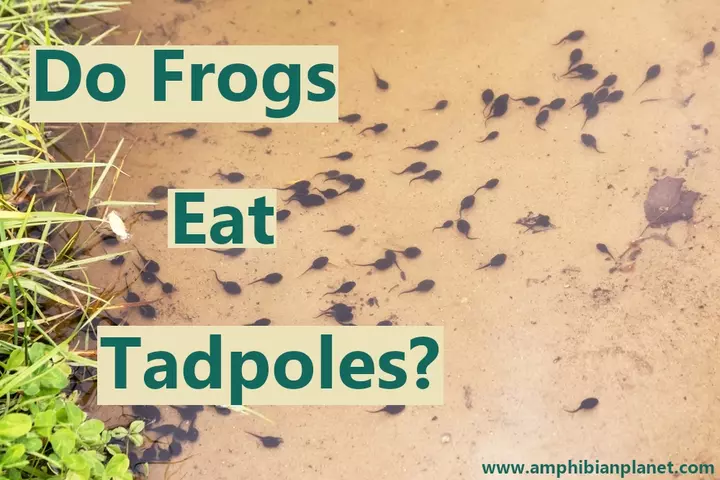Frogs have very diverse diets and aren’t picky with what they eat. They are mainly insectivores, which means their diet consists mostly of insects and other small invertebrates. However, they will eat almost any prey they can fit into their mouths. But do frogs eat tadpoles?
In general, frogs do eat other frogs’ tadpoles and even their own tadpoles – particularly when food sources in their environment are scarce. However, most frogs will generally avoid eating tadpoles when other food sources are available.
Many species of tadpole are also known to occasionally eat smaller tadpoles, even of their own species. They usually do this when they are in crowded pools where they have to compete for space and other limited resources.
Eating smaller tadpoles allows large tadpoles to eliminate some of their competitors, and improve the chances of their own survival.
Frogs Eat Their Own & Other Frogs’ Tadpoles
Frogs found in environments where food sources are limited are known to eat frog eggs and tadpoles. They generally prefer to eat the eggs and tadpoles of other frogs, but sometimes eat their own eggs and tadpoles.
African clawed frogs have been observed willingly eating their own, and other frogs’ tadpoles. Many toads are also known to eat their own offspring.
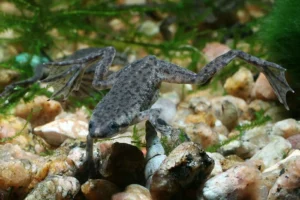
In one experiment, scientists from Stellenbosch University in South Africa placed African clawed frogs in tanks with tadpoles of their own species and those of the Cape clawed frog.
The frogs were observed eating tadpoles of their own species but preferred eating the tadpoles of the Cape clawed frog.
How Do Tadpoles Defend Themselves From Frogs Trying to Eat Them?
To stop frogs (and other predators) from eating them, tadpoles have several ways to defend themselves.
When a predator has been detected, most tadpoles will dive to the bottom of the water and hide among aquatic plants. They then blend into their environment, escaping the notice of the predator.
Some tadpoles, like those of the American toad, also avoid predators by swimming in very shallow water, and by swimming close together in schools during the day.
Also, many species of tadpoles have potent toxins that make them unpalatable to some would-be predators. A predator that tries to eat a poisonous tadpole will get a foul taste in the mouth, and let go right away.
Some tadpoles, such as those of the European common frog and the Moor frog grow longer tails when in the presence of predators. With longer tails, the tadpoles swim faster and are better at avoiding predators.
Some Tadpole Species Eat Smaller Tadpoles
Many species of tadpole have been known to eat smaller, vulnerable tadpoles. They usually do this when they are in crowded pools where they have to compete for space and other limited resources.
Eating smaller tadpoles allows large tadpoles to eliminate some of their competitors, and improve the chances of their own survival.
Tadpoles sometimes also eat other tadpoles when they are starving – sort of like a last resort to ensure their survival.
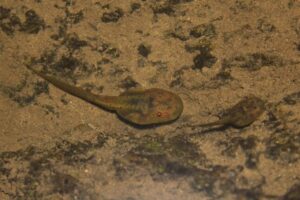
To test out tadpole cannibalism, a researcher by the name of Dale Jefferson of the University of Saskatchewan in Canada, studied captive wood frog tadpoles.
In the experiment, he tried feeding lone tadpoles a diet of ground-up tadpoles, but they refused to eat it until they were nearly starving.
However, when the tadpoles were kept in dense groups, it was found that they readily ate ground-up tadpoles.
Still, it was found that cannibal tadpoles did not grow as fast as tadpoles that were fed a mixture of brine shrimp, suggesting that the cannibal diet was not the most ideal.
This experiment demonstrates that wood frog tadpoles will not eat other tadpoles unless they are starving or competing with each other for resources.
Eating each other does not provide the best diet, but it helps eliminate competition for resources.
Do Frogs Protect Their Tadpoles?
About 10% of all known frog species care for their young. Of this group, it is the male frog that does the job in about two-thirds of species. However, most tadpoles grow up without any help from their parents. The mother frog abandons her eggs as soon as she has laid them.
A few frog species that care for their young are:
- Midwife toads
- Johnson’s horned tree frog
- Carvalho’s Surinam toad
- Southern Darwin’s frog
- African bullfrog
- Marsupial frogs
- Glass frogs
- Poison dart frogs
In these species, parental care may include the protection of eggs and/or tadpoles, transporting of tadpoles, feeding of tadpoles, or brooding of eggs. Most species only practice one of these forms of parental care.
For example, male African bullfrogs protect their tadpoles from birds, snakes, and other animals trying to eat them (including other frogs). They also create paths for the tadpoles to move from drying up ponds to filled ponds.
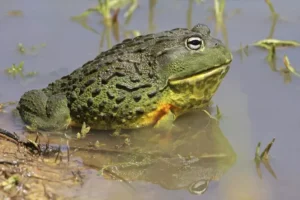
In many glass frog species, the mother’s brood the eggs during the night the eggs are fertilized, and the fathers stay with the eggs to guard them for much longer periods.
Mother marsupial frogs carry their young in a pouch on their back until they have grown from tadpoles into froglets (baby frogs).
Do Frogs Eat Baby Frogs (Froglets)?
Frogs will eat almost any prey they can fit into their mouths, and this includes froglets. Sometimes, frogs will eat froglets even of their own species.
American and African bullfrogs have been extensively documented eating smaller frogs, including those of their own species.
African clawed frogs are also known to readily gobble up smaller frogs, sometimes even their own offspring.
Northern leopard frogs have also been documented eating smaller leopard frogs.
All frogs are generalist carnivores and will eat just about anything they can swallow. They can even eat stinging insects such as bees, and even venomous snakes!
Large frog species such as bullfrogs and cane toads are more likely to cannibalize smaller frogs.
What Other Predators Eat Tadpoles?
Frogs and toads are not the only animals that prey on tadpoles. Tadpoles (and frog eggs) are also preyed on by:
- Newts (eastern newts, rough-skinned newts, smooth newts, etc)
- Dragonfly larvae
- Great diving beetle and its larvae
- Snakes such as garter and ribbon snakes
- Many predatory fish such as minnows and sticklebacks
- A wide variety of birds, including domestic birds such as ducks
Wasps are also known to eat the eggs of some tree frog species.
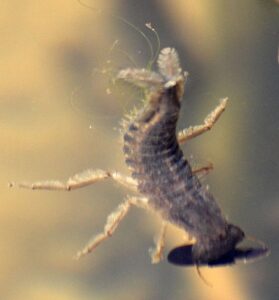
Tadpoles are easy prey for many animals. Sometimes, over 90% of tadpoles in a pond can be wiped out by predators before they transform into frogs.
Frequently Asked Questions (FAQS)
Do frogs eat their own tadpoles? Frogs are known to eat their own tadpoles if other food sources in their environment are scarce. African clawed frogs have been observed readily eating their own tadpoles. However, most frogs will not eat their own tadpoles if other food sources are available.
Do frogs protect their tadpoles? Most species of frogs do not protect their tadpoles. The mother frogs abandon their eggs just after laying them, and the tadpoles never meet their parents. However, some species such as the African bullfrog stay with their tadpoles to protect them from predators.
They also dig paths, so the tadpoles can leave drying up ponds, and move into filled ponds.
How long does it take tadpoles to turn into frogs? The majority of tadpole species will turn into froglets in 9-12 weeks and fully develop in 16 weeks. However, this varies based on several factors such as the temperature and the availability of food.
Conclusion
Frogs are generalist predators that eat almost any prey they can fit into their mouths, and tadpoles are not off the menu. However, it is important to note that tadpoles will not be the first choice of meal for most frogs.
Most frogs would rather eat bugs, worms, and other nutritious prey. They will only eat tadpoles when they are starving and cannot easily find other sources of food.
Still, some species like the African clawed frog will readily eat tadpoles, especially those of other frog species, even when other sources of food are available.
Learn More in These Interesting Guides:

